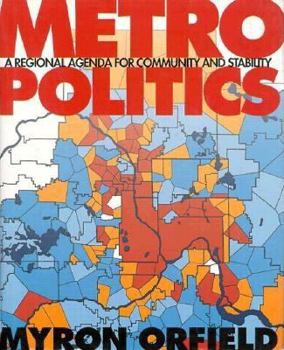Metropolitics: A Regional Agenda for Community and Stability
Select Format
Select Condition 
Book Overview
Metropolitan communities across the country are facing the same, seemingly unsolvable problems: the concentration of poverty in central cities, with flashpoints of increasing crime and segregation;... This description may be from another edition of this product.
Format:Paperback
Language:English
ISBN:0815766394
ISBN13:9780815766391
Release Date:January 1997
Publisher:Brookings Institution Press
Length:244 Pages
Weight:0.45 lbs.
Dimensions:0.8" x 7.5" x 9.2"
Customer Reviews
1 rating
Regionalism working in the U.S.!
Published by Thriftbooks.com User , 23 years ago
October 2000"METROPOLITICS: A regional agenda for community and stability" (1997) by Myron Orfield presents a convincing solution to a surprising array of problems. Americans hate sprawl, but they hate even more anything that they can find a way to label socialism. Orfield describes a system of regional government -- tried and tested by himself and others in Minnesota -- that promoters of corporate profit will have a difficult time pinning the pinko label on. Much of what Orfield thinks promotes sprawl are government regulations and projects of an undesirable sort. Regional planning reduces competition among towns, counties, and neighborhoods that hurts them all. Without regionalism, taxpayers end up subsidizing sprawl and ghettoization. Companies play one locality off against another to find the biggest giveaways. Developers lobby successfully for publicly funded infrastructure in the hinterlands, and affluent (largely white) residents move out of downtown. Schools in the city become dominated by poor students, taxes are raised to subsidize the wealthy suburbs, and white flight escalates.Orfield's book concentrates on the example of Minneapolis/St. Paul, but is applicable around the United States, and presents useful strategies for improving schools, creating affordable housing, and numerous other projects in addition to protecting the environment and quality of life. Orfield maintains that higher spending on schools in areas of concentrated poverty is pointless. What's needed, he says, is (aside from the elimination of poverty, and as a step in that direction) a redistribution moving some of the poor to the suburbs and some of the wealthy downtown. He wants to fight sprawl, in fact, by building affordable housing in the suburbs. This is because he sees a primary promoter of sprawl as ghettoization and white flight.Of course, Orfield also wants to see denser construction, and argues that competition among localities drives the desire for less dense construction in hopes that it will produce more tax revenue than it produces demand for services. Regional planning can avoid this vicious rivalry, and -- by mixing housing of various prices -- can allow people to live nearer their jobs, thus cutting the costs of transportation throughout the region.I think Orfield's point about schools is worth quoting a few passages. I, for one, am immediately suspicious of any assertion that what struggling schools need is not money. But this one I find persuasive:"Schools are the first victim and most powerful perpetuator of metropolitan polarization.""Few people realize that the central-city schools spend $7,060 per pupil. 15 percent more than any other group of districts in the Twin Cities. Spending on central-city schools is also high in Chicago, Atlanta, and many other cities throughout the United States. No matter where it occurs, higher spending does little to attract or retain middle-class students. The existing level of poverty and stude





